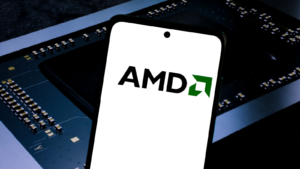Grand View Research says the global AI market could grow from about $137 billion in 2022 to more than $1.81 trillion by 2030.
Better, artificial intelligence-related spending will make up about 8% to 10% of information technology budgets in 2024, according to Wedbush. “This demonstrates a remarkable acceleration in AI spending after it comprised less than 1% of IT budgets in 2023,” added Seeking Alpha.
For an idea of how powerful the AI story has been, just look at Nvidia (NASDAQ:NVDA) and its massive growth over the last 12 months.
Since the start of the year, the tech powerhouse exploded from a low of about $450 to a recent high of $1,150. And it still has room to run. Better, when it splits its shares 10-to-1 on June 7, I don’t expect the NVDA stock to stay cheap for long. Once it splits, becoming a $115 stock using today’s price, it could easily explode higher again.
NVDA isn’t the only AI stock I’d bet on, though. Here are three more of the best AI stocks to buy and hold.
Iron Mountain (IRM)

With surging demand for power for artificial intelligence, data center real estate investment trusts (REITs) have been gaining momentum. Look at Iron Mountain (NYSE:IRM), for example.
With a yield of 3.2%, the IRM REIT “has extensive experience in supporting both traditional machine learning and generative artificial intelligence applications using high-performance compute (HPC) architectures in the data center,” as noted on its site.
The REIT just declared a dividend of 65 cents, payable on July 5 to shareholders of record as of June 17.
In addition, according to Goldman Sachs, with data center demand expected to rise, the “U.S. power demand (is) likely to experience growth not seen in a generation. Not since the start of the century has U.S. electricity demand grown 2.4% over an eight-year period, with U.S. annual power generation over the last 20 years averaging less than 0.5% growth.”
From its last traded price of $81, I’d like to see IRM closer to $90 a share in the near term.
Advanced Micro Devices (AMD)

Investors should also take advantage of the recent weakness in Advanced Micro Devices (NASDAQ:AMD). Last trading at $160, I’d like to see it retest $210 in the short term.
The company just revealed its latest AI chips, intensifying its competition with Nvidia.
That includes the Instinct MI325X accelerators, which are planned for availability in the fourth quarter. All as the “race to develop generative artificial intelligence programs has led to towering demand for the advanced chips used in AI data centers able to support these complex applications,” says Reuters.
In addition, the company introduced an upcoming series of chips titled MI350, which is expected to be available in 2025. AMD expects the MI350 to perform 35 times better in inference, or the process of computing generative AI responses, added AMD.
Analysts at Jefferies also initiated coverage of AMD with a buy rating, with a price target of $190 a share. AMD even just replaced Nvidia on the Wolfe Research Alpha List.
Global X Robotics & Artificial Intelligence ETF (BOTZ)

You can also diversify your portfolio with some of the best AI stocks at a low cost with an exchange-traded fund, such as the Global X Robotics & Artificial Intelligence ETF (NASDAQ:BOTZ).
After slipping from about $32 to $30.50, the ETF is again attempting to push higher. From its last traded price of $31, I’d like to see it initially retest $33.50.
With an expense ratio of 0.68%, or $68 annually on a $10,000 investment, the ETF invests in companies that could benefit from increased utilization of robotics and artificial intelligence. This includes those involved with industrial robotics and automation, non-industrial robots, and autonomous vehicles.
Some of its top holdings include Nvidia, Intuitive Surgical (NASDAQ:ISRG), C3.ai (NYSE:AI), and Upstart (NASDAQ:UPST) to name a few of the top ones. The nice thing about an ETF, such as BOTZ, is that you’ll pay less for greater exposure. For example, 100 shares of BOTZ will cost you just over $3,100.
While you could just buy 100 shares of NVDA, for example, it would cost you more than $116,000 at the moment. Plus, you wouldn’t be able to diversify as well as you could with the BOTZ ETF.
On the date of publication, Ian Cooper did not hold (either directly or indirectly) any positions in the securities mentioned. The opinions expressed in this article are those of the writer, subject to the InvestorPlace.com Publishing Guidelines.
Ian Cooper, a contributor to InvestorPlace.com, has been analyzing stocks and options for web-based advisories since 1999.
